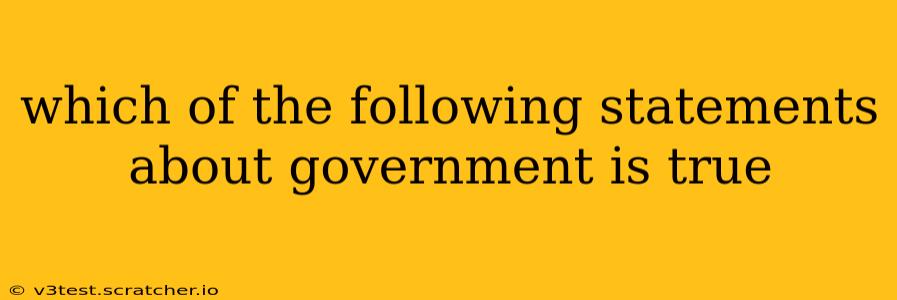Which of the Following Statements About Government is True? A Comprehensive Analysis
The question "Which of the following statements about government is true?" requires context. Without the specific statements, a definitive answer is impossible. However, we can explore common assertions about government and determine their veracity. To effectively answer this question, let's examine several key aspects of government and address frequently asked questions surrounding its nature and function.
What is the Purpose of Government?
The primary purpose of any government is to maintain order and provide services to its citizens. This includes upholding the rule of law, protecting its borders, and providing essential public services like infrastructure, education, and healthcare (the extent and nature of these services vary greatly depending on the political system and the level of government). However, the specific mechanisms used to achieve this purpose and the priorities of the government itself will vary significantly depending on the country's ideology and political structure.
What are the Different Types of Governments?
Several forms of government exist, each with its own strengths and weaknesses. These include:
- Democracy: A system where citizens have the power to choose their leaders. This can take various forms, including direct democracy (citizens vote directly on policy) and representative democracy (citizens elect representatives to make decisions on their behalf).
- Autocracy: A system ruled by a single person with absolute power. This can range from a monarchy (power inherited through family lineage) to a dictatorship (power seized through force).
- Oligarchy: A system where power is held by a small elite group.
- Theocracy: A system where religious leaders hold power.
The "true" statement about government will depend heavily on which type of government is being discussed.
How Does Government Impact Citizens' Lives?
Government significantly impacts the daily lives of its citizens through various means:
- Laws and Regulations: Governments create and enforce laws to maintain order, protect rights, and regulate various aspects of life, from commerce to environmental protection.
- Public Services: Governments provide essential services like healthcare, education, infrastructure, and social security, impacting access to opportunity and quality of life.
- Economic Policy: Government economic policies, such as taxation, spending, and monetary policy, influence economic growth, employment, and inflation, directly impacting citizens' financial well-being.
- National Security: The government is responsible for protecting its citizens and its territory from external threats, providing national defense and security services.
What are the Challenges Faced by Governments?
Governments face numerous challenges, including:
- Maintaining Stability and Security: Threats to national security, internal conflict, and political instability can all significantly impact a government's effectiveness.
- Balancing Competing Interests: Governments must balance the needs and interests of different groups within society, often facing difficult choices with no easy solutions.
- Ensuring Accountability and Transparency: Corruption, lack of transparency, and accountability issues can erode public trust and undermine the legitimacy of the government.
- Adapting to Change: Rapid technological advancements, globalization, and demographic shifts require governments to adapt and evolve to meet the challenges of the modern world.
To accurately determine which statement about government is true, provide the list of statements for analysis. By understanding the functions, types, and challenges of different governmental systems, we can effectively evaluate the truthfulness of any claim regarding government.
